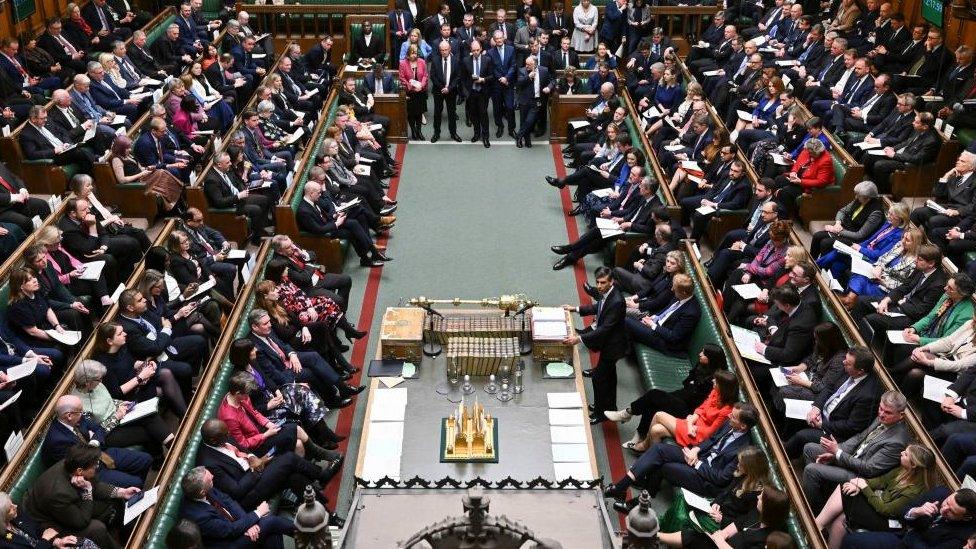Why some Tory MPs are stepping down
- Published

So far, 20% of Conservative MPs - a total of 63 - have announced they are jacking it in at the general election.
And 20% of Scottish National Party MPs have said the same.
The figure is 8% for Labour MPs.
The reasons for leaving the House of Commons are usually a mix of circumstance and psephology.
The personal and the political.
An individual's decision reveals a little.
A collection of decisions reveals a trend.
And the trend is clear.
Parties whose MPs might conclude their fortunes are heading south have a greater propensity to volunteer their departure from Westminster rather than wait, potentially, for the electorate to do it for them.
In other words, they are illustrations, as a trend, of the impact of the political prevailing wind, or at least where it is perceived to be blowing, given current opinion polls.
Take the departures of Robert Halfon and James Heappey as ministers.
Both will have their personal reasons informing their decision. Mr Heappey has acknowledged that "a great deal has changed in my life over the last few years".
But: both are highly regarded within their parties and beyond.
Both are passionate about their briefs.
Both fell over themselves, to a greater or lesser extent, to be full of praise for Rishi Sunak.
These are not figures, by temperament, instinct or actions, that are mounting a political insurrection.
But if folk like Mr Halfon and Mr Heappey are walking away, it tells a story.
Robert Halfon has built up a sizeable majority in Harlow in Essex.
But it is a classic bellwether seat, the kind of place that tends to elect an MP from the party that wins the election.
The Labour leader Keir Starmer wasn't wandering around a primary school there recently by accident, telling kids he used to play the flute.
The places he pops up in are rigorously chosen and highlight in plain sight where Labour has its eyes on.
James Heappey won the seat of Wells in Somerset, external from the Liberal Democrats in 2015.
The new seat, Wells and Mendip Hills, will be keenly fought.
For some departing ministers, there is another factor in their minds, which comes in the form of an acronym: Acoba.
It stands for the Advisory Committee on Business Appointments, external.
The committee sets out the rules about the jobs former minsters can and cannot take on, and when - to try to make sure they are not milking their knowledge and contacts within government.
There are no end of rules, but as a rule of thumb the more political water that passes under the bridge, the more time that passes, the more tolerant Acoba are likely to be.
So, if you're a serving minister wanting or expecting to end up doing something else after the election, it is rational to consider packing it in now so the clock starts ticking now and not leaving it to start ticking at some point down the track.
Being an MP, while a privilege, isn't easy, splitting your life between two places, the welter of public scrutiny and being subject to the vagaries of your party's political fortunes.
And there is always turnover, natural wastage as a human resources director might put it, at every election.
So we shouldn't be surprised, right now, that some are thinking of leaving - and that you're more likely to be having just those thoughts if you think your party might be going backwards.
And this will be far from the end of it.
Plenty more will leave, I suspect - with many backbenchers, in particular, probably leaving it until the very last minute to announce they have had enough.